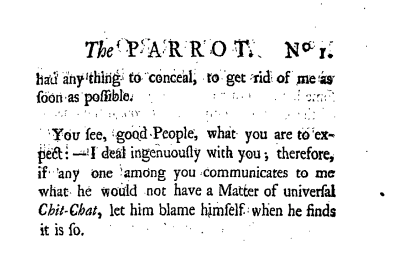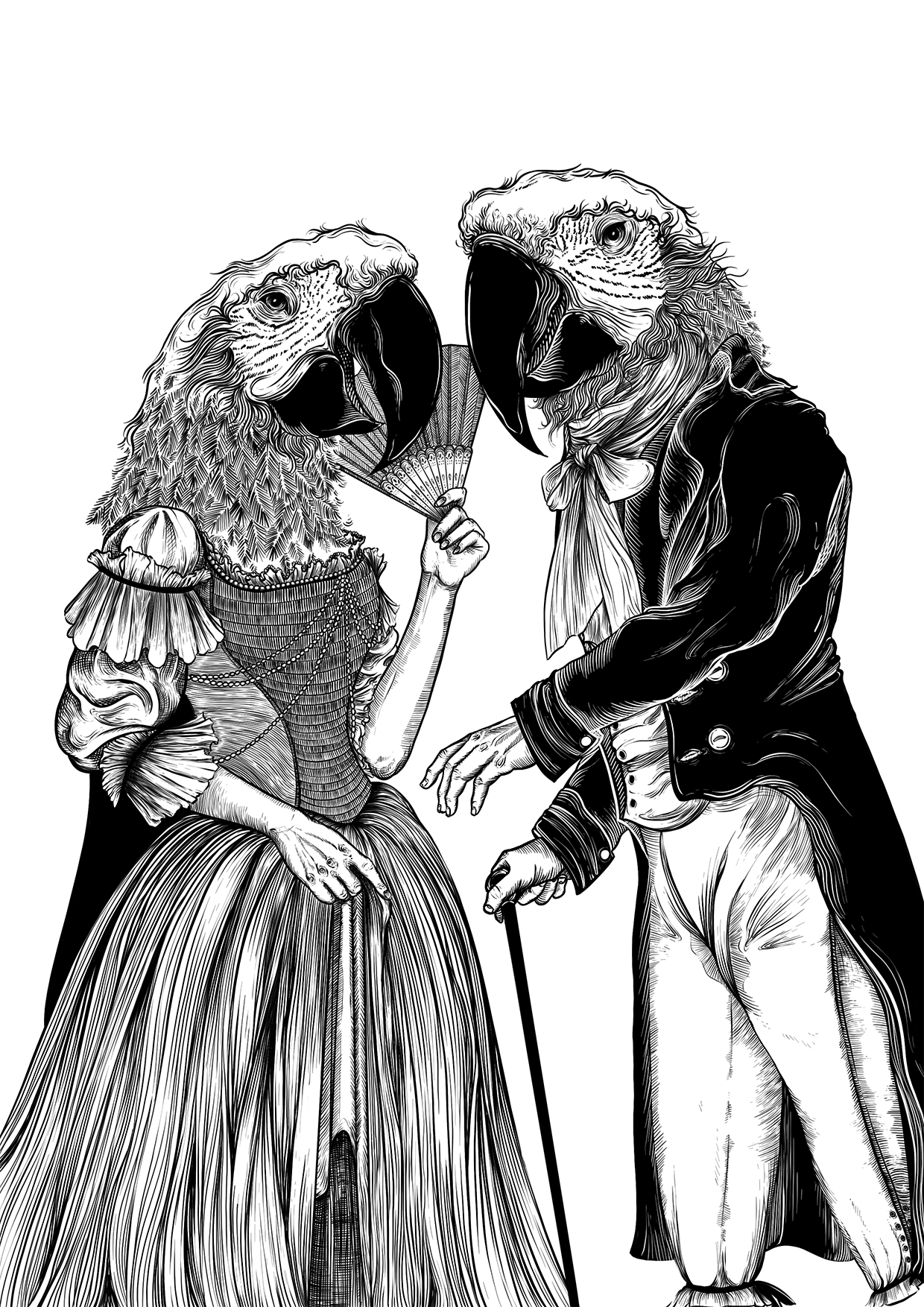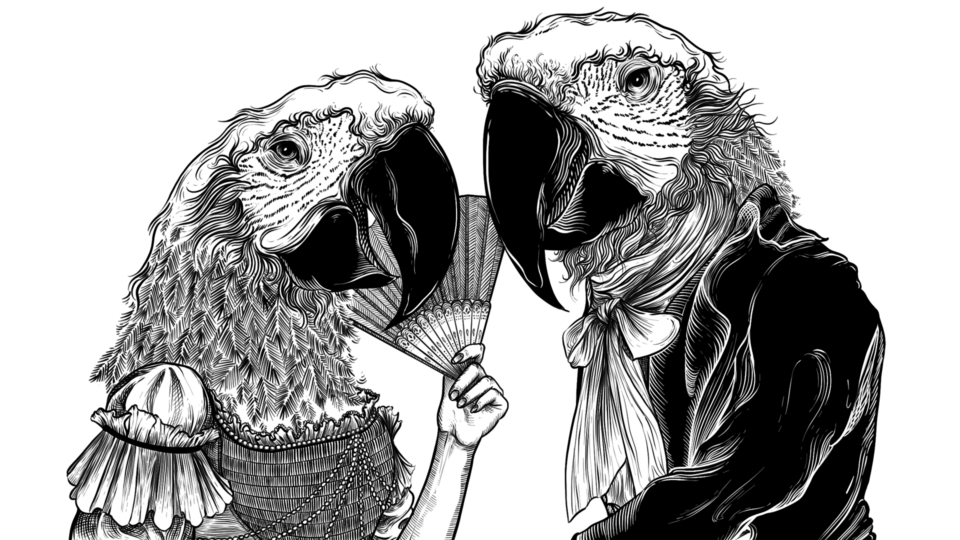Forget Bridgerton’s Lady Whistledown, the most savage high society commentator of Georgian times was an angry green parrot
York St John University students make The Parrot accessible for modern audiences for the first time
A fascination with royal affairs and high society gossip may seem at its peak during the current digital age but history shows us there was a huge appetite for it in Georgian England too. In the eighteenth century the upper classes wouldn’t need to worry about social media exposure, but what about the scandalous secrets that their pets could reveal?

This is the premise of a satirical periodical called The Parrot, authored, and published by Eliza Haywood in 1746. The paper invited its readers to imagine that it had been written and edited by an angry green parrot. The bird, having been taken from his native home and forced to live in a cage in London, enjoyed spilling secrets and skewering London society.
Students from the English Literature BA (Hons) and Publishing MA courses at York St John University are now transcribing and annotating the first modern edition of the periodical.
The success of the Netflix series Bridgerton has sparked fresh interest in the era and the team hope it will draw more people to Eliza Haywood’s work. Lady Whistledown’s fictional periodical is based on the real eighteenth-century tradition of using fictional pseudonyms as the voice of controversial or satirical periodicals, and The Parrot is one of best examples of this.

In adopting the voice of a parrot, Haywood was reappropriating an insult often levelled against competent, clever, or satirical women in the eighteenth century. Such women were often written off in the coffee houses of eighteenth-century London for being “pretty prattlers”, the implication being that if they said something clever, they must simply be repeating something they heard elsewhere.
The result is a proto-feminist, anti-racist work which takes no prisoners and packs a stunningly prescient punch. It is also a text which has never been published in a modern edition, until now.
This will be the first time the text has ever been made fully available in a modern and completely accessible version. Previously only scanned images of the original three-hundred-year-old text have been available. These cheaply produced prints were published before spelling was standardised and are very difficult to read.
“I love the thought of making more of her work accessible to show that eighteenth-century literature isn’t just made up of fusty old men.”
Dr Adam J Smith, Associate Professor in English Literature, York St John University said:
“Eliza Haywood’s The Parrot is remarkable in both is continued relevance today and in the way it disrupts popular assumptions about the eighteenth century and about eighteenth-century women in particular. This subversive, satirical periodical not only takes its inspiration from an insult often levelled against women writers by adopting the voice of a parrot, but then uses that voice to call out prejudice and bigotry in the real-world Haywood was operating in. Haywood’s parrot repeatedly insists on the danger of judging others on the basis of their race, gender, class or social status.
“I hope that people will read this edition of The Parrot and see that there was a huge diversity of opinion in the eighteenth century, that women writers did carve out a space for their voice to be heard, and that in the case of women like Eliza Haywood, Mary Leapor or Jane Collier, they used satire to challenge the status quo and advocate for change and social justice.”
Maddison Warley, English Literature BA (Hons) student said:
“We’ve certainly felt the pressure to do justice to Eliza Haywood’s original work, especially as the project has had more support and grown larger than we had anticipated!
“However, there are so many underrated female authors in the eighteenth century, so it’s been incredibly rewarding (and often emotional) to help bring the words of one of them to a wider audience.”
Charanjoth Batth, English Literature BA (Hons) student said:
“The most challenging part of the project for me was the tedium of transcription, it’s not necessarily hard but it’s a fairly long task and The Parrot currently exists as facsimiles of the original manuscript so in some cases the text is slightly obscured which adds the need to decipher unclear phrases.
“I didn’t realise how enjoyable eighteenth-century literature could be until I studied Haywood’s novella Fantomina, so I love the thought of making more of her work accessible to show that eighteenth-century literature isn’t just made up of fusty old men.
“It’s also pretty amazing that it is produced by students, as we’ve tried to include features that we enjoy in books in this edition to maximise the experience of both students and casual readers!”
Charlotte Tunks, Publishing MA student said:
“From a publishing perspective, the project has given me the opportunity to gain some valuable experience that I can take with me when I graduate.
“From working with the publishing software and a wonderful group of second-year students, to thinking through design choices, accessibility, and understanding the need for more critical editions of unknown historical texts, there has been so much to take forward.”
The new edition of The Parrot will launch at York Georgian Festival this August. It will be published as an eBook and made freely available online for anyone who wants to use it for research or teaching, or simply wants to know more about one of the most satirical and subversive women writers of the eighteenth century.
Sarah White, from York Mansion House is the creator of York Georgian Festival. She said:
“We are thrilled to welcome the fabulous minds of York St John University to the second annual York Georgian Festival. Dr Adam Smith and five fantastic students present ‘Uncovering The Parrot’ on Sunday 4 August. This presentation will bring a new dimension to this year’s programme as we walk in the shoes of a female author from the eighteenth century and how she navigated prejudice with humour and determination.”
Tickets are available here www.yorkgeorgianfestival.co.uk

